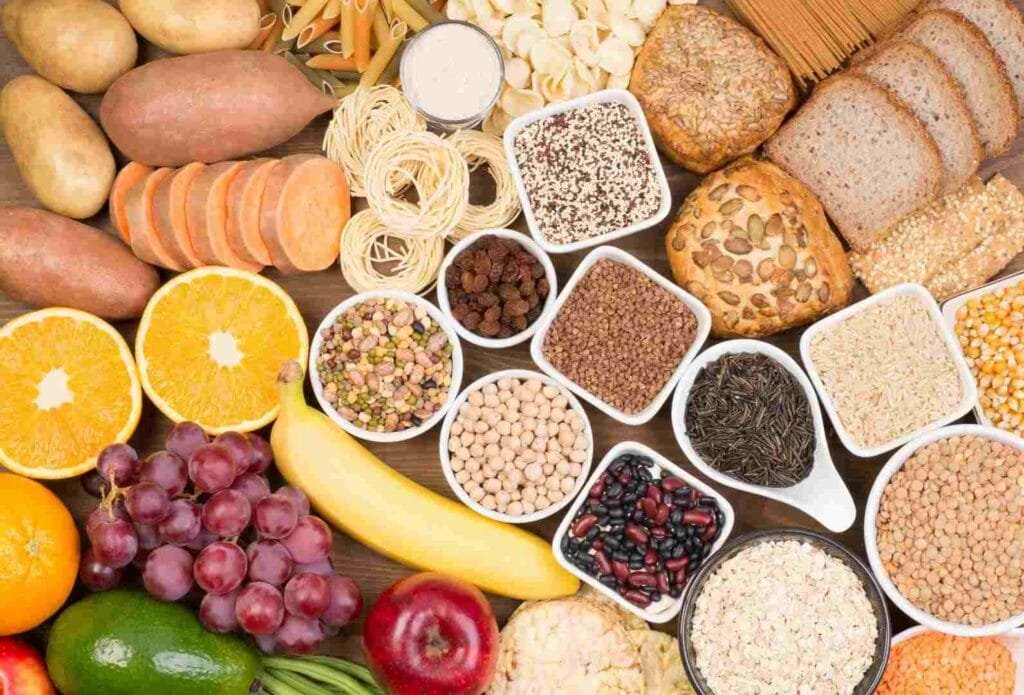What is Carbohydrates?

Carbohydrates are essential nutrients that supply energy to the body, found in foods like fruits, vegetables, grains, and dairy. They are generally divided into three main categories: sugars, starches, and fibers. Sugars are simple carbohydrates present in fruits, vegetables, and dairy products. Starches are complex carbohydrates that take longer to digest, found in foods such as potatoes, bread, and rice. Dietary fiber, although also a carbohydrate, is unique in how it functions within the body.
Table of Contents
Types of Carbohydrates
Carbohydrates are one of the body’s main sources of energy and come in three types:
Monosaccharides
These are single sugar molecules, the simplest form of carbohydrates. Examples include glucose (a key energy source), fructose (naturally found in fruits), and galactose (a component in milk).
Disaccharides
These are slightly more complex and made of two linked monosaccharides. Common examples are sucrose (table sugar), lactose (sugar in milk), and maltose (found in grains). Disaccharides must be broken down to be absorbed.
Polysaccharides
These are complex carbohydrates made of many sugar units. Starch (in foods like rice and potatoes) and glycogen (stored in the liver and muscles) are common polysaccharides. Dietary fiber is also a polysaccharide but differs because it resists digestion in the human digestive tract.
What Is Dietary Fiber and Why Does It Matter?
Dietary fiber is a carbohydrate that our bodies cannot fully digest, meaning it mostly passes through the digestive system intact. Found in plant-based foods like fruits, vegetables, grains, and legumes, dietary fiber comes in two main types:

Soluble Fiber dissolves in water and creates a gel-like substance in the gut. This type helps to lower blood cholesterol and regulate blood sugar levels. It’s abundant in foods like oats, apples, carrots, and citrus fruits.
Insoluble Fiber doesn’t dissolve in water and adds bulk to stool, which helps prevent constipation and keeps digestion regular. Insoluble fiber sources include whole grains, nuts, beans, and many vegetables.
Health Benefits of Dietary Fiber
Fiber has multiple health benefits, impacting various bodily functions:
Supports Digestive Health
Insoluble fiber adds bulk to stool, aiding in preventing constipation and supporting the overall health of the digestive system. It acts like a natural brush, keeping the digestive tract clean.
Helps Control Blood Sugar
Fiber, particularly soluble fiber, slows sugar absorption, which helps maintain steady blood sugar levels. This is especially useful for individuals with diabetes, as it can minimize blood sugar spikes after eating.
Assists with Cholesterol Levels
Soluble fiber has been shown to help reduce “bad” LDL cholesterol by binding to bile, which contains cholesterol, and aiding in its removal from the body. This may lower the risk of heart disease over time.
Aids in Weight Control
High-fiber foods tend to be more filling, which can help people feel full longer, potentially lowering calorie intake and supporting weight management.
Recommended Fiber Intake
Daily fiber recommendations vary depending on age and sex. On average, adult women should aim for 21–25 grams of fiber daily, while men should target 30–38 grams. Many people don’t reach these daily targets, often because their diets lack adequate whole grains, fruits, and vegetables.
Adding more fiber to meals can be simple: choosing whole grains over refined options and opting for fruits and vegetables as snacks can significantly boost fiber intake.
The Essential Roles of Carbohydrates in the Body
While primarily known for energy, carbohydrates also serve other vital roles:
Main Energy Source: Carbohydrates provide the body’s primary energy supply. When we eat carbs, the body breaks them down into glucose, which fuels cells throughout the body, especially the brain, which depends largely on glucose for energy.
Preserves Protein: Carbohydrates provide energy, so the body doesn’t have to break down protein for fuel. This “protein-sparing” effect allows protein to focus on building and repairing tissues, supporting muscle health, and aiding immunity.
Energy Storage: Carbohydrates are stored as glycogen in the liver and muscles, creating a reserve of energy to be used when food isn’t available. This function is particularly important during physical activity or when immediate energy is needed.
Facilitates Fat Metabolism: To fully break down fats in the body, carbohydrates are necessary. When carbs are scarce, fats only partially break down, producing ketones. This can lead to ketosis, a condition where ketones build up, making the blood more acidic.
In summary, carbohydrates and fiber are crucial to overall health, providing energy and supporting various body functions, including digestive, cardiovascular, and metabolic health. Adding a range of fiber-rich, carbohydrate-containing foods to your diet can promote optimal health and well-being.
Frequently Asked Questions (FAQ)
How do high-fiber foods contribute to weight management?
High-fiber foods help with satiety, making you feel full for longer periods and potentially lowering overall calorie intake. This helps support weight control by reducing the likelihood of overeating.
How can I increase my daily fiber intake?
Incorporating more fruits, vegetables, whole grains, and legumes into your diet is a simple way to increase fiber intake. Opting for whole grains over refined grains and choosing fiber-rich snacks, like fruits and nuts, can also help.
Related Articles

